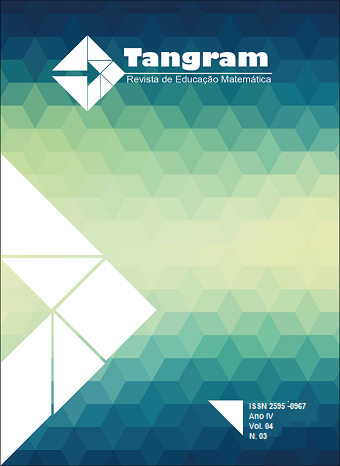História da educação matemática: sua importância na formação de professores
DOI:
https://doi.org/10.30612/tangram.v4i3.13912Keywords:
ensino de matemática, educação matemática, históriaAbstract
Este artigo tematiza o papel da história da educação matemática na formação de professores. Coloca como questão central a ser respondida pelo texto: Como se dá a elaboração da matemática que o professor deve ensinar nas escolas? Para responder à questão, analisam-se as diferenças existentes entre ensino de matemática e educação matemática. A partir dessa análise promove-se a distinção entre duas searas distintas de pesquisa: história do ensino de matemática e história da educação matemática. O estudo utiliza como referência principal teórico-metodológica as pesquisas de André Chervel sobre história das disciplinas escolares. Como resultado do trabalho realizado, é feita a defesa de que a um dado tempo, num dado contexto social, político e cultural, as relações estabelecidas entre o campo disciplinar matemático, o campo da docência e as ciências da educação dão origem a uma dada matemática para o ensino, uma referência de trabalho para o professor que ensina matemática.
Downloads
References
Artigue, Michelle. (2008). Continu, discontinu em mathématiques. Quelles perceptions en ont les élèves et les étudiants? In: VIENNOT, L. Didactique, Épistémologie et Histoire des Sciences. Paris: PUF.
Bachelard, Gaston. (1938 [1967]). La formation de l’esprit scientifique. Paris: Vrin.
Chervel, André. (1988). L’histoire des disciplines scolaires – Réflexions sur um domaine de recherche. Histoire de l’éducation. Paris: SHE, N. 38, mai.
D´Ambrosio, Ubiratan. (2008). Uma história concisa da Matemática no Brasil. Petrópolis, RJ: Vozes.
Klein, Félix. (2009 [1908]). A matemática elementar de um ponto de vista superior. Volume 1. Parte 1. Aritmética. Lisboa: SPM.
Montessori, Maria. (1934). Psico geometria. Barcelona: Casa Editorial Araluce, 1934. Disponível em: https://repositorio.ufsc.br/handle/123456789/159258. Acesso: 26/9/2020.
Nobre, Sergio. (2008). Biografias de matemáticos brasileiros – um projeto historiográfico. IN: Anais do VII Seminário Nacional de História da Matemática. Guarapuava, PR: UNICENTRO.
Sachot, Maurice. (2006). Les disciplines scolaires, les modèles et les contre-modèles des curriculums de formation professionnelle. In: LENOIR, Y.; BOULLIER-OUDOT, M. H. Savoirs professionnels et curriculum de formation. Québec: Les Presses de l’Université Laval, 2006.
Valente, Wagner Rodrigues. (2010). Trends of the history of mathematics education in Brazil. ZDM (Berlin. Print), p. 1863-9704.
Valente, Wagner Rodrigues. (2015). História da educação matemática nos anos iniciais: a passagem do simples/complexo para o fácil/difícil. Cadernos de História da Educação, UFU. V. 14, N. 1, - jan./abr., p. 357-367.
Downloads
Published
How to Cite
Issue
Section
License
Authors must accept the publication rules when submitting the journal, as well as agree to the following terms:
(a) The Editorial Board reserves the right to make changes to the Portuguese language in the originals to maintain the cultured standard of the language, while respecting the style of the authors.
(b) Authors retain the copyright and grant the journal the right to first publication, with the work simultaneously licensed under the Attribution-NonCommercial-ShareAlike 3.0 Brazil (CC BY-NC-SA 3.0 BR) that allows: Share - copy and redistribute the material in any medium or format and Adapt - remix, transform, and create from the material. CC BY-NC-SA 3.0 BR considers the following terms:
- Attribution - You must give the appropriate credit, provide a link to the license and indicate whether changes have been made. You must do so under any reasonable circumstances, but in no way that would suggest that the licensor supports you or your use.
- NonCommercial - You may not use the material for commercial purposes.
- Sharing - If you remix, transform, or create from material, you must distribute your contributions under the same license as the original.
- No additional restrictions - You may not apply legal terms or technological measures that legally restrict others from doing anything that the license permits.
(c) After publication, authors are allowed and encouraged to publish and distribute their work online - in institutional repositories, personal page, social network or other scientific dissemination sites, as long as the publication is not for commercial purposes.






